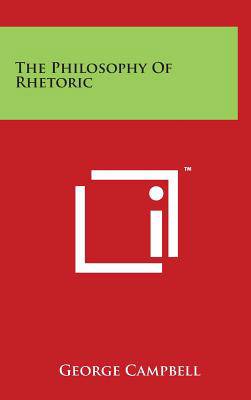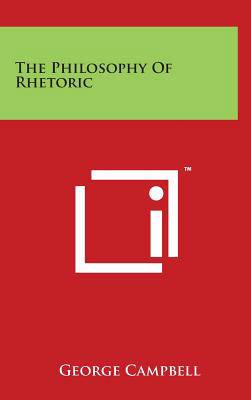
- Retrait gratuit dans votre magasin Club
- 7.000.000 titres dans notre catalogue
- Payer en toute sécurité
- Toujours un magasin près de chez vous
- Retrait gratuit dans votre magasin Club
- 7.000.0000 titres dans notre catalogue
- Payer en toute sécurité
- Toujours un magasin près de chez vous
Description
The Philosophy of Rhetoric is a classic work of rhetorical theory written by George Campbell. First published in 1776, this book is still widely read and studied today. It is considered one of the most influential works on rhetoric ever written, and it has had a profound impact on the field of communication studies.The book is divided into three parts. The first part deals with the nature of rhetoric, its definition, and its relationship to other disciplines. Campbell argues that rhetoric is not just about persuasion, but also about the art of communicating effectively. He also discusses the different types of rhetoric, including deliberative, judicial, and epideictic.The second part of the book focuses on the principles of rhetoric. Campbell outlines the different elements of effective communication, including style, arrangement, and delivery. He also discusses the importance of understanding the audience and adapting one's message to their needs and interests.The final part of the book deals with the application of rhetoric. Campbell provides examples of how rhetoric can be used in different contexts, including politics, law, and religion. He also discusses the ethical implications of rhetoric and the responsibility that comes with using it effectively.Overall, The Philosophy of Rhetoric is a comprehensive and insightful exploration of the art of communication. It is a must-read for anyone interested in the field of rhetoric or communication studies.This Is A New Release Of The Original 1849 Edition.This scarce antiquarian book is a facsimile reprint of the old original and may contain some imperfections such as library marks and notations. Because we believe this work is culturally important, we have made it available as part of our commitment for protecting, preserving, and promoting the world's literature in affordable, high quality, modern editions, that are true to their original work.
Spécifications
Parties prenantes
- Auteur(s) :
- Editeur:
Contenu
- Nombre de pages :
- 438
- Langue:
- Anglais
Caractéristiques
- EAN:
- 9781494155797
- Date de parution :
- 29-03-14
- Format:
- Livre relié
- Format numérique:
- Genaaid
- Dimensions :
- 152 mm x 229 mm
- Poids :
- 752 g

Les avis
Nous publions uniquement les avis qui respectent les conditions requises. Consultez nos conditions pour les avis.






